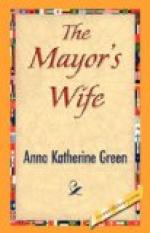“But these—” How I wish I could have seen her face! “These half-hearted voters, their easily stifled convictions are what make majorities,” she stammered. Mr. Steele may have bowed; he probably did, for she went on confidently and with a certain authority not observable in the tone of her previous remarks. “You are right. The paragraph reflecting on me must be traced to its source. The lie must be met and grappled with. I was not well last week and showed it, but I am perfectly well to-day and am resolved to show that, too. No skeleton hangs in the Packard closet. I am a happy wife and a happy mother. Let them come here and see. This morning I shall issue invitations for a dinner to be given the first night you can assure me Mr. Packard will be at home. Do you know of any such night?”
“On Friday week he has no speech to make.” Mrs. Packard seemed to consider. Finally she said: “When you see him, tell him to leave that evening free. And, Mr. Steele, if you will be so good, give me the names of some of those halfhearted ones—critical people who have to see in order to believe. I shall have them at my table —I shall let them see that the shadow which enveloped me was ephemeral; that a woman can rise above all weakness in the support of a husband she loves and honors as I do Mr. Packard.”
She must have looked majestic. Her voice thrilling with anticipated triumph rang through the room, awaking echoes which surely must have touched the heart of this man if, as I had sometimes thought, he cherished an unwelcome admiration for her.
But when he answered, there was no hint in his finely modulated tones of any chord having been touched in his breast, save the legitimate one of respectful appreciation of a woman who fulfilled the expectation of one alive to what is admirable in her sex.
“Your idea is a happy one,” said he. “I can give you three names now. Those of Judge Whittaker, Mr. Dumont, the lawyer, and the two Mowries, father and son.”
“Thank you. I am indebted to you, Mr. Steele, for the patience with which you have met and answered my doubts.”
He made some reply, added something about not seeing her again till he returned with the mayor, then I heard the door open and quietly shut. The interview was over, without my having felt called upon to show myself. An interval of silence, and then I heard her voice. She had thrown herself down at the piano and was singing gaily, ecstatically.
Approaching her in undisguised wonder at this new mood, I stood at her back and listened. I do not suppose she had what is called a great voice, but the feeling back of it at this moment of reaction gave it a great quality. The piece—some operatic aria—was sung in a way to thrill the soul. Opening with a burst, it ended with low notes of an intense sweetness like sobs, not of grief, but happiness. In their midst and while the tones sank deepest, a child’s voice rose in the hall and we heard, uttered at the very door:




